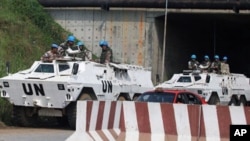As the international community presses Ivorian President Gbagbo to step down, economic and political sanctions appear the tools of choice. But will they work?
It's been more than a month since Ivorian presidential elections which most countries consider were won by challenger Alassane Ouattara. But Ivory Coast's incumbent President Laurent Gbagbo clings to power. He gained more time Tuesday, after a delegation of West African leaders failed to convince him to step down. Threats of military intervention by the West African regional group ECOWAS are on hold as negotiations continue.
Still, Washington-based analyst Nu Akuetteh says the widespread international condemnation of Mr. Gbagbo is striking. Akuetteh is former director of the U.S. nongovernmental organization Africa Action, and has spent years working in West Africa. "Africa has had similar crises a lot. But this one is unique in how united the African Union and ECOWAS has been in saying Mr. Gbagbo has to go," Akuetteh said.
For now, economic and political pressure appear the tools of choice. The European Union and the United States have imposed travel restrictions on Mr. Gbagbo and his entourage. The World Bank has frozen loans to Ivory Coast and West Africa's central bank has transferred control of state reserves to Mr. Ouattara.
France, Canada, the European Union and the United Nations no longer recognize Mr. Gbagbo's ambassadors; Mr. Ouattara's newly appointed UN ambassador has already begun work. And France's Le Figaro newspaper reports the EU may impose new sanctions in early January, if Mr. Gbagbo does not step down.
Akeutteh believes tougher sanctions are needed now - including freezing overseas bank accounts belonging to Mr. Gbagbo and his wife. "I absolutely agree that we have to try sanctions first," Akeutteh explains. "But they must be serious sanctions. I don't think the sancitons that have been pushed so far have been pushed quickly enough and sharply enough."
Video clip: Ivory Coast Diplomat Warns Crisis Threatens to Bring Genocide
Venance Konan, a prominent Ivorian author and independent journalist based in Abidjan, agrees on the need for stronger financial sanctions. "We hope the international community will increase the pressure and we hope that this pressure will work ...not on Mr. Gbagbo, because I think he's absolutely crazy, but on the military, the soldiers who protect him," Konan stated.
Konan says tightening the financial noose may deprive Mr. Gbagbo of the means to paying these soldiers, who may turn against him if they don't get their salaries.
International sanctions have so far failed to dislodge the leader of another African country - President Robert Mugabe of Zimbabwe. But Daniel Bourmaud, Africa analyst and professor at the University of Bordeaux in France, says the case of Mr. Gbagbo is different.
Bourmaud says Mr. Mugabe has always managed to secure a degree of support from some African countries. By contrast, he says the unity of African states in demanding Mr. Gbagbo cede power, is unprecedented.
Meanwhile, observers warn that another option - military intervention to remove Mr. Gbagbo from power - may spark fighting that spills into other African states.
"We're afraid the military option will cause a lot of deaths. But at the end, if the sanctions and the international pressure doesn't work on Mr. Gbagbo, maybe the military option will be the Last," Konan said.
As time drags on, analyst Akuetteh says, it is playing into Mr. Gbagbo's hands. After years of conflict, Ivorians are tired. And Mr. Gbagbo is an expert at stalling - managing to stay in power for five more years after his presidential mandate expired. "He thinks people will lose interest," he said. "He thinks the international community will turn its interest elsewhere."
If sanctions fail, French analyst Bourmaud says they will show the limits of international diplomacy and African unity. But if they succeed, he believes they may set a precedent for resolving future African crises.
